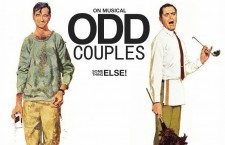On the most basic level, a singer/songwriter is a musician who performs his or her own compositions. Sometimes, the introspection of the lyrics, simplicity of the music, and confessional nature of the performance are also details used to further refine this determination.
However, with so much pop music history constantly passing under the bridge and floating out to sea, the boundaries that define a singer/songwriter seem to be more mysterious than ever. Maybe that’s why so many artists who are considered in any way at all to occupy this musical niche write so many songs about darkness and night: It’s not only the perfect metaphor for being lost, helpless, and alone, but, oddly enough, it also covers being focused, self-reliant and complete.
Here are a few artists, all contemporaries, all considered to be singer/songwriters to some degree or other, tackling the darkness, the night, and the great existential empty void.
“Night of the Living Dead” by Garland Jeffreys (1979) vs. “Night Rally” by Elvis Costello (1980): “Everybody was dead in their head,” sings Garland Jeffreys on this album track from 1979’s American Boy and Girl. “Everybody’s singing with their hand on their heart,” chimes Elvis Costello on the closing cut from the U.K. version of 1978’s This Year’s Model. It’s easy enough to connect the two songs: Jeffreys’ zombie nightclubbers grow up to become Costello’s socio-political fascists.
Winner: Two pretty good songs here, but the prize goes to Elvis Costello for sucker punching the record company when he slipped the previously pulled “Night Rally” onto a U.S. release via the Taking Liberties compilation in 1980. Take that, you musical Mussolinis!
“Straight Into Darkness” by Tom Petty (1982) vs. “Old Men Sleeping On the Bowery” by Willie Nile (1980): A bit of an apples and oranges thing going on here. Tom Petty’s song floats with both a musical and a lyrical ambience, which leaves the listener with an impression of lost love but not a lot of specifics. On the other hand, Willie Nile and his band hit a nice minor key groove to go along with a detailed description regarding some of New York City’s down and outers. Both work, but it’s hard to say which is preferable.
Winner: this one goes to Willie Nile, who hit this song (and a lot of others) way out of the park on his 1980 debut. As for Tom Petty? Simply put, he’s a great writer too, but in this particular case, he’s written better.
“Restless Nights” by Bruce Springsteen (1980) vs. “Endless Night” by Graham Parker (1981): “Restless Nights,” the outtake from the pen of the prolific Bruce Springsteen, was recorded in 1980 for The River but didn’t make an official appearance until the Tracks box set. Maybe the reason it missed the original cut was because Bruce already had a schwackload of “night” related titles, and there was a danger of turning an already commonly used literary convention into a cliché. Or maybe no matter how you want to frame it, the song just feels like an outtake or B-side. Graham Parker’s album cut from 1981’s The Up Escalator doesn’t fare much better. The generic title and the paint-by-numbers rhyme scheme function as OK album filler, but nothing special.
Winner: the Boss. Why, you ask? Well, how much does he like “night” songs? Turns out Bruce Springsteen is actually singing the backing vocals for Graham Parker on Parker’s own session. It’s like Bruce got wind of a song called “Endless Night” in progress down at the studio, and he just couldn’t stay away. Cliché or not, that kind of commitment has gotta count for somethin’.
- How David Bowie’s ‘The Next Day’ Stripped Away All of the Artifice - March 15, 2023
- Why Deep Purple’s ‘Who Do We Think We Are?’ Deserves Another Listen - January 11, 2023
- In Defense of the Often-Overlooked Mott the Hoople - November 10, 2022




